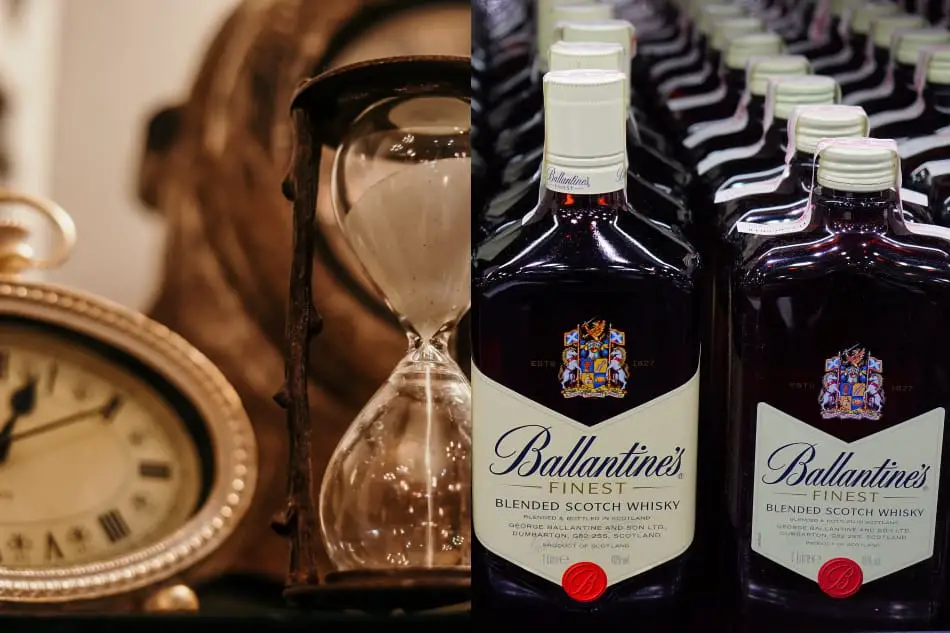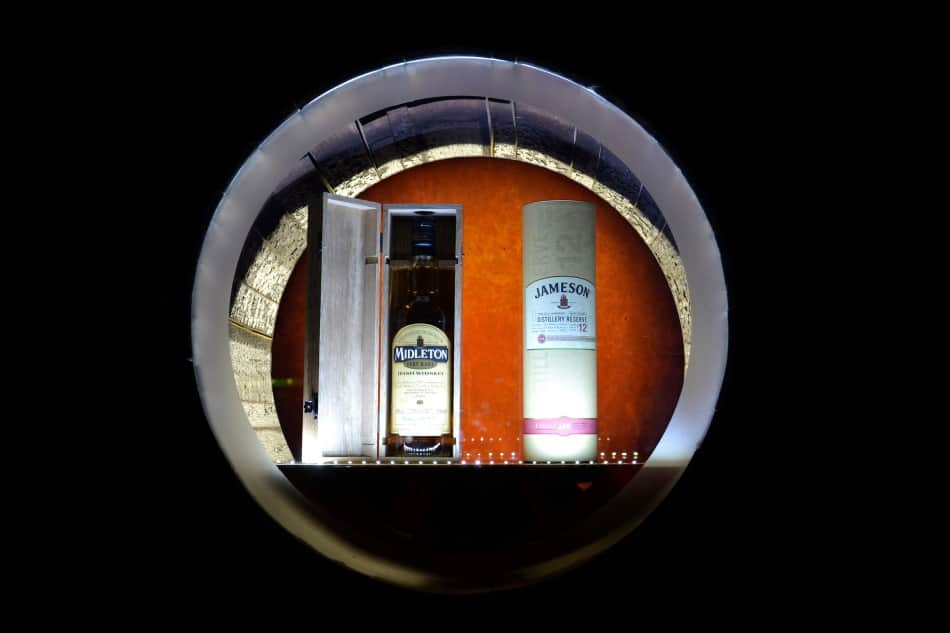Whether you bought a few bottles of your favorite whiskey because they were on sale, or you bought a few new bottles to try over the next few months, or even bought some expensive whiskey to keep as a long-term investment: either way you’ll want to know exactly how long bottles of whiskey last unopened. Here’s everything you need to know.
An unopened bottle of whiskey lasts indefinitely and does not expire, provided that it has an airtight seal and that you don’t do anything to damage it, like leave in the sunlight or the heat. This is in contrast to opened bottles of whiskey that will oxidize after 6 months to two years.
In the rest of this article, I’ll explain why under normal circumstances, unopened bottles of whiskey last indefinitely, what can cause them not to, and how to ensure that doesn’t happen.

Why Unopened Bottles of Whiskey Last Indefinitely
There are two reasons why, under normal circumstances, unopened bottles of whiskey last indefinitely. The first is because whiskey is pretty hard to damage in the first place and the second is because the bottle is still sealed.
Because Whiskey Is Hard to Damage in The First Place
Whiskey is pretty hard to damage in the first place. That’s because it only ages and picks up its flavors in the casks it’s matured in, so once it’s bottled it doesn’t continue to age and change until it starts to deteriorate and eventually expire.
Also, its high level of alcohol (more than 40%ABV) freezes the whiskey’s esters, congeners and volatile alcohols, which puts them in a type of suspended animation, preserving them and preventing them from deteriorating. The whiskey’s high level of alcohol also creates an inhospitable environment for the bacteria that would otherwise cause it to go bad.
I have written a more detailed article about why whiskey is pretty hard to damage, which you can find here.
Because The Bottle Is Still Sealed
The second reason why unopened bottles of whiskey last indefinitely is because they’re still sealed. The importance of the bottle’s seal can’t be understated because despite being pretty hard to damage otherwise, when exposed to oxygen, whiskey becomes oxidized.
Oxidation is when oxygen binds to one chemical compound and turns it into another, and in whiskey that means binding to one flavor compound and turning it into another. This doesn’t make your whiskey go bad or become dangerous to drink – it’s still drinkable, but it does mean that it won’t taste the way it’s supposed to, and its original flavors will no longer exist.
This means that as soon as you open a bottle of whiskey and air can get to it, it will start to oxidize – although it takes anywhere between six months and two years for its flavors to change, depending on how much air can get to the whiskey. So as long as your bottle of whiskey remains unopened, air can’t get to it, the oxidation process can’t start, and it will last indefinitely.
When Unopened Whiskey Doesn’t Last Indefinitely
Having said that, there are three circumstances under which even unopened bottles of whiskey don’t last indefinitely. Exposure to direct light or sunlight, leaving it unprotected from evaporation, and exposure to oxygen.
1. Exposure To Direct Light or Sunlight
Unopened bottles of whiskey stored long term in direct light or worse, direct sunlight will not last indefinitely and will go bad within one or two months.
That’s because the direct light or sunlight creates a chemical reaction in the volatile compounds of the whiskey which causes them to break down, and the flavor to degrade. When you eventually do open the bottle, the whiskey will taste much harsher, possibly even of rubber, paint thinner or rotten fruit.
2. Leaving It Unprotected from Evaporation
Unopened bottles of whiskey will not last indefinitely if they’re not protected from evaporation. And although you might think, since your bottle is sealed and you haven’t noticed any change in the level of the whiskey inside, that nothing could have escaped, the truth is that your precious whiskey has been slowly evaporating away.
That’s because although many seals are airtight, they’re not 100% airtight, which leaves some room for the whiskey to evaporate. It’s also because evaporation is usually quite slow, so if you’re only storing your unopened bottles for a few years, the minimal amount of whiskey that evaporates during that time will not be obvious or worth preventing.
The real problem occurs when you store unopened bottles of whiskey long term because then the minimal amount of evaporation starts to add up. After about 10 years you’ll certainly notice that some whiskey has evaporated and after 30 – 40 years the amount lost will be significant.
3. Exposure to Oxygen
As mentioned, when whiskey is exposed to oxygen it becomes oxidized and this eventually causes its flavors to change.
This is usually a problem for opened bottles which are unsealed and therefore, even when tightly closed, let in air, and which have more headspace – the empty space in your bottle between the cork or lid and the whiskey that’s actually air, but it can be a problem for unopened bottles too.
That’s because of the same things that allow evaporation to occur. The airtight seal that’s not 100% airtight not only lets small amounts of whiskey out of the bottle, it also lets small amounts of air in. And once again, over time this can add up to be enough air to oxidize your whiskey and enough time to change its flavors.
How To Ensure Unopened Whiskey Lasts Indefinitely

To ensure that your unopened bottles of whiskey last indefinitely, you need to store it in a way that protects it from becoming damaged, evaporating or oxidizing. I have written a more detailed article about how to store whiskey, which you can find here, but basically that means the following:
Away From Direct Light and Sunlight
Storing your unopened bottles of whiskey away from direct light and direct sunlight will prevent it from causing the chemical reactions in your whiskey that make it go bad.
In A Cool Temperature
It’s important to store your unopened bottles of whiskey in a cool temperature – 15°-20°C or 59°-68°F. That’s because higher levels of heat will speed up the process of evaporation.
In A Stable Environment
It’s also important to store your unopened bottles of whiskey in a stable environment where the temperature doesn’t fluctuate too much. That’s because with every fluctuation, oxygen can flow into the bottle and speed up the process of oxidation.
Standing Up but Regularly Turned
Unopened bottles of whiskey should be stored standing up. That’s because if they’re stored lying down, the 40% or more ABV whiskey will be in constant contact with the relatively more fragile cork causing it to disintegrate, become loose and let in more oxygen.
On the other hand, the corks of unopened bottles of whiskey that are stored standing up for very long periods of time, can dry out causing it to chip or crumble, and again become loose and let in more oxygen. That’s why you need to turn your bottles over every so often. Either rest them horizontally for an hour or so twice a year or turn them upside down for a few seconds once a month.
With An Additional Airtight Seal
To ensure that no air gets into unopened bottles of whiskey whose seals might not be 100% airtight, you can add an additional seal. This can be an additional cap on top of the lid or cork or by dipping your bottle in wax. However, these methods can damage the bottle and the underlying seal, and so are not the best solutions, especially if the whiskey is valuable.
A better solution is to use parafilm. This is a film made from a blend of waxes and polyolefins that’s semi-transparent and flexible. It’s malleable, non-toxic, tasteless, odorless, and self-sealing. You can wrap it around the lid making it airtight and it won’t harm the underlying seal. The only downside is that after some time it becomes brittle and less effective, so it needs replacing every five to seven years.
You can buy All Purpose Laboratory Parafilm on Amazon here (affiliate link).
(affiliate link).

